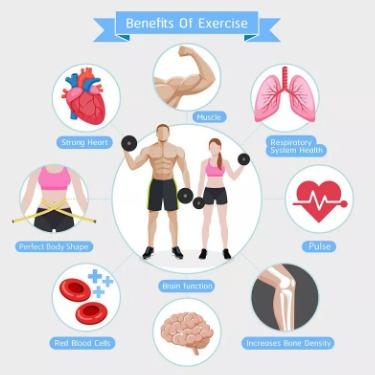The Importance of Exercise: A Path to a Healthier Life
Exercise is one of the most crucial components of a healthy lifestyle. It is not just about physical appearance or fitness goals but also about maintaining overall well-being. Regular exercise has profound benefits for the body and mind, helping individuals live healthier, happier, and more productive lives.
Why is Exercise Important?
In today’s fast-paced world, sedentary lifestyles and desk jobs have become common, leading to a host of health problems. Exercise helps counter these effects by improving physical health, enhancing mental clarity, and reducing the risk of chronic diseases.
Benefits of Regular Exercise
1. Improves Physical Health:
Exercise strengthens the heart, improving circulation and reducing the risk of cardiovascular diseases.
It enhances muscle strength, flexibility, and bone density, reducing the risk of injuries and conditions like osteoporosis.
Regular physical activity helps maintain a healthy weight by burning calories and boosting metabolism.
2. Boosts Mental Health:
Exercise releases endorphins, also known as "feel-good hormones," which reduce stress, anxiety, and depression.
It improves sleep quality and increases energy levels, making individuals feel more refreshed and alert.
Engaging in physical activity enhances cognitive functions, including memory and concentration.
3. Prevents Chronic Diseases:
Regular exercise lowers the risk of developing lifestyle diseases such as diabetes, hypertension, and obesity.
It helps regulate blood sugar levels, reduces bad cholesterol, and strengthens the immune system.
4. Enhances Longevity:
Studies show that people who exercise regularly tend to live longer and enjoy a higher quality of life in old age.
5. Promotes Social Interaction:
Group exercises, sports, or gym sessions encourage socializing, building a sense of community and motivation.
Types of Exercise
Aerobic Exercise: Activities like walking, running, cycling, and swimming improve heart and lung health.
Strength Training: Weightlifting and resistance exercises build muscle strength and endurance.
Flexibility Exercises: Yoga and stretching improve flexibility and prevent stiffness.
Balance Exercises: Activities like tai chi enhance coordination and prevent falls, especially in older adults.
Incorporating Exercise into Daily Life
Set aside at least 30 minutes a day for physical activity.
Choose activities you enjoy, such as dancing, playing a sport, or hiking, to stay motivated.
Take the stairs instead of the elevator or walk short distances instead of driving.
Practice consistency over intensity—start slow and gradually increase the duration and intensity of your workouts.
Conclusion
Exercise is not just a choice; it is a necessity for a healthy and fulfilling life. By dedicating time to physical activity, you invest in your physical, mental, and emotional well-being. Whether you’re young or old, fit or just starting, it’s never too late to embrace the habit of regular exercise. So, lace up your shoes, take a step forward, and enjoy the countless benefits of staying active.
Your health is your wealth—keep moving and stay healthy!

